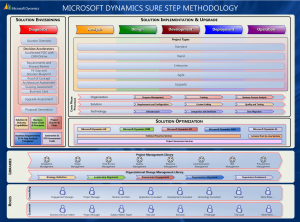Assuring Project Quality…
Project Managers will frequently grapple with the subject of project quality. Should it be factored at the start, middle or end of a project life-cycle? Who is responsible for project quality? There are a number of methodologies for ensuring project quality, which is the best? In the following article, we take a look at the ways to ensure quality can be met and how we achieve it at SeeLogic.
A holistic approach
At SeeLogic we take a holistic approach to delivering projects. This means taking the ‘best’ aspects of both Agile and Waterfall. Our experience reveals that Agile works well to assure parallel stages but there will be a stage in every project where release candidates are based on agreed functionality. Taking this approach ensures that the solution is enriched through effective defined sprints, show and tell sessions and final functionality. The solution is industrialised using this approach.
Using Microsoft’s Sure Step Methodology an approach known as the Quality Management Manifesto is progressed to achieve a solution delivered process.
The latter assures customer expectation management is mapped by initially listing conditions of satisfaction together with an attitude of continuous improvement for the project. The aim is to achieve a ‘consistency of purpose’ to achieve continuous and permanent product and service improvement.
In the Sure Step methodology, project quality control and assurance are manifested through each cross-phase of the agreed implementation plan.

Microsoft Sure Step Methodology Diagram from Microsoft
Examples of where quality control and management are accentuated and specifically applied:
- The Programme Management cross-phase uses specific activities and templates focused on Quality control.
- The Quality and Testing cross phase focuses on due diligence to ensure the solution is customised as per agreed standards and requirements
- Under the Optimisation umbrella a proactive approach /oversight from a technical and governance aspect is taken, including actions that can be performed during production to ensure that the solution will continue to operate effectively.
- Performance management is key to ensure that the solution is tested from a load perspective.
- Service readiness testing is key to ensure that infrastructure, anticipated expansion or review of roles and responsibilities is considered in advance of any solution release.
CoS elements are identified at the outset of an engagement and noted with a published and agreed with client Project Charter. The assigned project manager is responsible for working with the customer to ensure that activities agreed will be executed rather than leaving them (the project charter items) to be lost and not be a prominent driver for the project.
A key component of project quality control during the implementation is Tollgate Reviews. Our experience has found that for a typical waterfall project, Tollgate reviews are called out at the end of each Phase (or agreed with client gate). With waterfall type projects, Tollgate reviews assess project health and reviewing key milestone.
For Agile projects, we ensured that Tollgate reviews take place at the end of every agreed Sprint, effectively, conducting a retrospective.
Tollgate reviews are key to ensure CoS are being met.
Key Quality and Testing Cross-Phase
SeeLogic prioritise testing as key to the success of a project as it assists in reducing ambiguity in the final configuration, development and test stages. These standards are gathered and documented in our test plan. The latter communicates general procedures when conducting software testing and validation. The plan may also encompass projected business processes and workflow changes anticipated in the customer organisation.
The Test Plan also provides a general overview of monitoring and testing activities that will be performed during the course of the implementation. Test plan essential elements include: rigour, recommended number of tests, test throughput (estimated time/resources needed from both the client and SeeLogic to perform tests), orientation for test team members (guidance on acceptable levels of performance and how to ‘mark’/grade a rest result and agreed levels of Priority 1 and 2 failures. A resolution and regression test process is also documented.
Test types:
Sub-process testing is also conducted. For example, checking if a specific function is intuitive and as per agreed design.
Process testing:
Whilst the latter focuses on a sub-set of a customer’s workflow, the Process Test is a complete set of related features and functions that make up a defined business process.
Data Acceptance Testing (DAT).
DAT verifies for example, data migrated from an existing system to the new system forms the correct data subset and cleansing has taken place. In addition, validation of all data needed for transactions, enquiry and reporting will be available.
Other essential tests include: Integration testing and Performance testing. Finally, User Acceptance Testing focuses on complete end-to-end testing to ensure that the system that SeeLogic delivers meets the business requirement and test criteria initially established/agreed. UAT is typically performed in a Testing or Staging environment. The UAT leverages scripts that are prepopulated with test steps and expected results. The actual results of testing are documented for future reference and customer approval.
If you would like find out more about how SeeLogic can help you ensure your CRM project is a success, please contact us.
About the author:
Dr Savi is a crucial member of SeeLogic Projects’ team and has a extensive knowledge of project principles and delivery. Key highlights from his career to date include development of his own management and business methodologies. He has consulted on projects from large global enterprises including MBNA, Exxon, TSB and NatWest. He was Head of Consultancy at Unisys leading a 120 strong team. In recent years, he has successfully completed projects for: Deutche Bank, 3, Vodafone, Sky TV, O2, NHS, Dept of Health, BCS & Investors in People.
